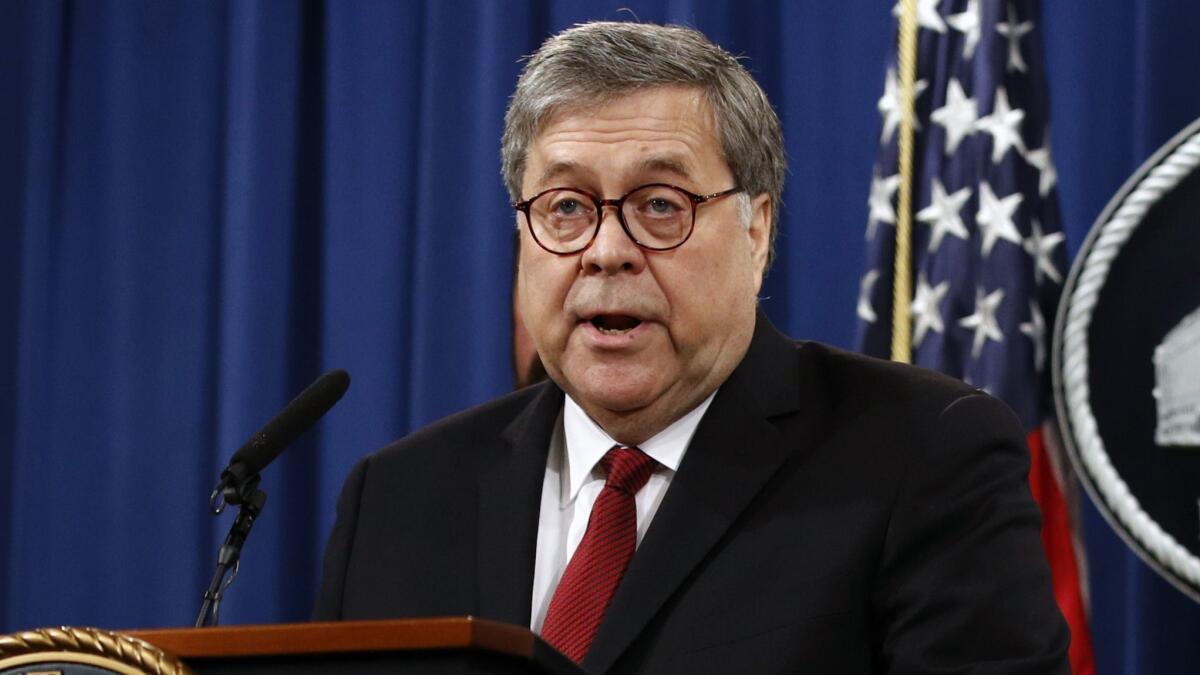Editorial: Failed Trump policing commission report includes a few useful nuggets

- Share via
There are two ways to read the final report by the President’s Commission on Law Enforcement and the Administration of Justice, submitted Tuesday by Atty. Gen. William Barr on the eve of his early departure from the Justice Department.
The first is to see it as the completely illegitimate, politically self-serving defense of retrograde policing practices that it is. It reflects the commission’s unbalanced membership (it consisted only of law enforcement officials), its lack of civil rights or racial justice perspectives, and its unlawful proceedings held with insufficient public notice or public input. The rogue panel’s work was so legally out of bounds that a federal judge ordered the final product to be emblazoned with a prominent disclaimer or withheld altogether. The mandated wording appears on the report’s inside front cover, and the court’s order is attached.
Working against a backdrop of the police killings of George Floyd, Breonna Taylor and others, the nationwide protests that followed and the accompanying discussions of anti-Black racism throughout society and in policing in particular, the 332-page report is stunning in its omission of any acknowledgment of racial disparities or indeed any but the most cursory mentions of race or racism. In the commission’s blinkered view, the increases in crime and disrespect for the law were caused by anti-police protests, apparently not by brutal police killings. Elected officials “demonize” law enforcement to gain political favor, not to address urgent injustices. Progressive or “social reform” district attorneys try to undermine the justice system, not to make it more just, when they exercise their discretion to not prosecute lesser crimes. Mass incarceration is a myth. Police have a duty to “secure compliance by force.” Excessive force is a result of not following police orders.
As for solutions, the commission suggested that police departments use their (public) resources to promote positive narratives about law enforcement. They should update their websites. States should exert stronger control over locally elected progressive prosecutors. Police should get greater access to private surveillance footage. People should learn to “comply then complain” in response to threats of improper force — do whatever police order, and later bring complaints about inappropriate or illegal orders to the authorities.
The report reflects President Trump’s desire to burnish his law-and order credentials, support his allies in the Fraternal Order of Police and other traditional policing groups and one-up the Obama administration’s Commission on 21st-Century Policing, which angered the FOP with its calls for more responsible police practices, better oversight and more cognizance of racial disparities in arrests and uses of force. By flouting the law that requires balance and transparency in such commissions, Trump and Barr made certain that their report would ratify their positions on crime, police and public safety.
In so doing, they came up with a product that is astonishingly irrelevant to 2020.
Yet there is a second way to read the report, scanning for signs of common ground between the conservative law enforcement establishment and those who would more assertively curb police conduct.
And there is indeed some common ground. The report complains, as do many police officers and leaders, that law enforcement has been inappropriately tasked, by default, with decidedly non-police functions. Cops shouldn’t have to deal with the social problems causing, and caused by, homelessness. They shouldn’t have to be mental health clinicians. They shouldn’t be the only responders to substance-use disorders. It should be easier for people to call directly for someone other than the police in the event of a crisis.
Other areas of overlap: Federal and state reimbursements should be more readily available to treat psychiatric conditions inside and outside of jail. Mental health and trauma are serious concerns for police officers, not just for those they police, and should be treated with greater awareness and better and more easily obtainable care. Society, lawmakers, voters — all should build or rebuild public health and safety programs with more appropriate skills and expertise for dealing with nonviolent behavior.
The report’s glaring failures and omissions undermine its more useful observations, which have also been expressed by law enforcement leaders in other forums. Still, the apparent consensus among police, police reformers and to some extent even police abolitionists on necessary public safety alternatives to policing is noteworthy, and suggests that progress is possible — if we can get past the cluelessness and partisanship that pervade much of the report.
More to Read
A cure for the common opinion
Get thought-provoking perspectives with our weekly newsletter.
You may occasionally receive promotional content from the Los Angeles Times.










